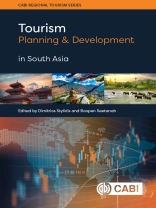Tourism has huge significance as a global economic and social phenomenon, and given the growing reliance on the industry by service-dependent economies around the world, the lack of focus on tourism planning and development in South Asia is surprising. Current issues including social, environmental and cultural aspects underpinned by security challenges have defined the tourism development narratives in many South Asian countries over the last decades and lead to fluid demand and supply patterns. The appetite for and reliance on tourism growth is seen regardless of the numerous challenges faced by the region. Despite a rich and steady history of tourism and demand driven by numerous pull-destinations, most South Asian countries have not invested or benefitted from global tourism growth trends.
This book discusses tourism planning and development in South Asian countries and reveals successful and unsuccessful stories by:
providing thorough analyses of the nature and focus on tourism development in South Asia;
analysing the experiences and challenges addressed via country-focused chapters;
identifying the key impacts and current challenges;
including cases from Bangladesh, Bhutan, India, Maldives, Pakistan, Nepal, Sri Lanka and more.
Written by scholars with extensive research experience on tourism in these countries, this book is a much-needed resource and an invaluable reference for researchers, policy makers and other tourism stakeholders involved in tourism planning and development.
Circa l’autore
Boopen Seetanah is Professor in International Economics and finance at the University of Mauritius and the WTO Chair Programme Co-Chair. He is also the director of research at the International Centre for Sustainable Tourism and Hospitality (ICSTH) at the University of Mauritius. Boopen’s research interest is in international tourism and trade, international finance and applied economics. He is/has been a consultant for a number of international organisation such as the World Bank, UNEP, COMESA, RMCE, UNDP and ADB among others.












